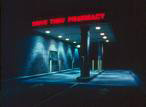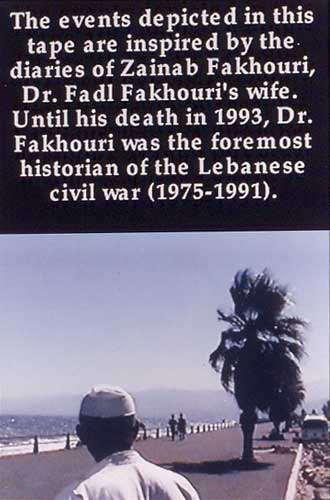Part of Winter 2003
If the US is at war with Iraq by the time March 15th rolls around, it will come as no surprise. War has hung palpably over our heads for the last year and a half. For some, it has been more than a suggestion, with rampant violence and death a neighbourhood occurrence. For those of us in North America, only occasionally has the fallout from aggression actually manifested itself outside of our living room television sets. The White House may have declared an endless war on terrorism, but this war is still very far away, even if we may be some of the culprits.
This programme examines our own culpability on a continent that has grown rich from the hidden spoils of war. Guns appear occasionally, but scars transect every frame. These tapes and films do more to interrogate power and hate than to address any specific conflict. But perhaps there is a lot to draw from them in the current global polity, where difference – the “with us or against us” – is now the context of war. At the very least, they pierce the notion of simple dichotomies and offer more advanced ideas of how violence reverberates.
Tonight we’re bringing the war home, with our own ticker-tape parade. Recent work by locals Aleesa Cohene and Gariné Torossian march alongside pieces by Peggy Ahwesh, Rachel Schreiber, Standish Lawder and Walid Ra’ad. These films and videos look at how power plays out in the body and the body politic. From S&M appropriation of Nazi imagery to the virtual worlds of Lara Croft and the Planet of the Apes, these works look at the context from which a society allows itself to go to war. It’s a love letter to George W. Bush, with only a hint of fine white powder.
Programme:
Absolutely, Aleesa Cohene, 2001, video, 8:00 min.
Please Kill Me, I’m a Nigger Faggot Jew, Rachel Schreiber, 1996, video, 12:00 min.
Ape Shit, Leah Gilliam, 1999, 16mm (on VHS), 7:00 min.
Death to Everyone, Gariné Torossian, 2000, 16mm, 6:00 min.
In Order Not to Be Here, Deborah Stratman, 2002, 16mm (on DVD), 33:00 min.
intermission
The Dead Weight of a Quarrel Hangs, Walid Ra’ad, 1999, video, 17:00 min.
Necrology, Standish Lawder, 1970, 16mm, 12:00 min.
She Puppet, Peggy Ahwesh, 2001, video, 15:00 min.
“In the days following the September 11th attacks, my mind’s eye superimposed the death throes of the World Trade Centre over the screen of whatever film I watched. Tonight we will attempt a similar superimposition, looking for the roots of violence within the cultural body. None of these films deal directly with our current conflict – only one is less than a year old – but all of them reveal symptoms of a sociopathic culture, one that gluttonously absorbs all it can from those that it can overpower.
Many of these films deal with the oppression of difference – common currency in a world of the with or the against. The segregation inherent in the walls of surburbia of In Order Not to Be Here and amongst the mammals of Ape Shit make it no surprise that the first thing that eroded in the last year and a half was civil liberty. The historical resonance of Please Kill Me… and Death to Everyone show how the divisions of the past carry on and are subsumed into the present, inherited psychologically or played out from father to son. Dead Weight&lrquo;¦ and Necrology offer moments from beyond, after war and after life, making strange the petty differences of conflict and dispute.
A programme then, not so much about war than about its triggers and its aftermaths. How responsible are we &lrquo;” in both senses – on this continent that has grown rich from the hidden spoils of war? What is our internal relationship to violence, hidden or spoken, which makes the path towards war so seemingly irreversible? How does power play out in our bodies and the body politic? And finally, what is the aftermath, does the game end in darkness? That seems too cruel for a sequence of events that began with &lrquo;˜Lucifer’s greatest work of art’ (to quote Stockhausen), a tragic rupture that illuminated our global discord, a second chance from the god of light.” (Chris Kennedy)


